Why was Diamonds coach Lisa Alexander fired?
Lisa Alexander coached the Diamonds netball team for nine glorious years. So why was she fired?
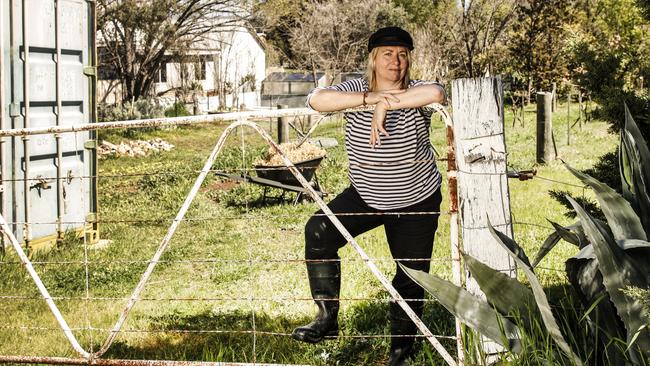
The indoor netball court at the Victorian Institute of Sport is a strange space, squeezed into the ground floor of a refurbished red brick grandstand. In fact, it’s only two thirds of a court – that’s all that would fit into the old building, meaning that for more than a decade many of Australia’s best netballers have trained for countless hours on this anomaly. Lisa Alexander knows every centimetre of the court. As head coach of the national team, the Australian Diamonds, she would often hold small group training sessions here. And on February 11, she settled behind a table in the middle of that same space and calmly announced to a packed room of media, staff and players that she had been fired.
It was the end of a successful tenure: 102 matches made her the most capped national netball coach ever. Despite two significant losses by a single goal apiece, the Diamonds never shifted from top spot in the sport’s world rankings from the day she was appointed. The team was dominant, and scandal-free. During the nine years she was in charge, Australia’s men’s cricket team churned through three coaches. The Wallabies? Three. Socceroos? Four.
But despite her success, Alexander never felt her job was safe. “I really have to tell you that for the entire time, since 2011, when I was appointed… you’re always looking over your shoulder. The Australian netball coach may not be scrutinised by the public as much as say [recently fired Brisbane Broncos head coach] Anthony Seibold. But from within, from the netball community, and particularly from the past Australian players and coaches, you’re definitely scrutinised.”
This is the first time Alexander, 56, has spoken publicly about the circumstances that led to her firing. After an initial approach months ago, she agrees to talk it through over the phone in late August. I’m told to ring only once I’ve put my two-year-old daughter down for the night. With Alexander, family comes first. She seems more relaxed; her trademark black bob is lighter now and life away from the hot seat is agreeing with her. She has traded her Melbourne digs for a miner’s cottage in Avoca, a small town in Victoria’s Central Highlands, where she’s often found in gumboots, pottering around, enjoying the vineyard out the back that’s just waking up after winter, and a tall flowering gum outside her kitchen window. She’s trading bird photos with a neighbour, learning about the history of the area. Slowing down a tad. But it’s hard to see someone as driven as her staying away from sport for too long.
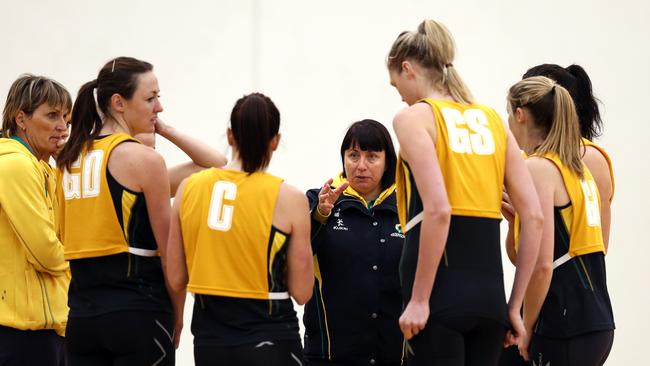
Lisa Alexander was the first Diamonds coach who hadn’t played for the team. She narrowly missed out on selection in the 1980s, but in this game, even narrow losses feel enormous. Netball’s cohort of retired stars have a powerful voice behind the scenes and Alexander felt they were wary of her path to the top job. “The thing that was always called into question was, ‘Oh well, does she really know what it’s like, and can she get that sense across to the athletes?’ You’ve got to earn your stripes, and that’s OK. I’ve never had a problem with that.”
Netball is a federated sport, and as a result it is highly political, with various states constantly tugging the national body in different directions. Alexander wasn’t silly enough to think she could ignore that political game, but she was determined to keep her focus on the court. “The ability to deal with the politics while keeping your eye on the prize… that’s what I admire about the politicians who do it well. They’re political animals but they can do the job as well. But we haven’t got many good ones who can do it all.”
In truth, Alexander had long been used to being the outsider. She grew up in the blue-collar Melbourne suburb of Cheltenham; her father was a truck driver and her mother worked as a sales rep in the local supermarkets. She was a tomboy who wore Olympic bathers while pretending to be Shane Gould – her childhood idol – while swimming laps in her backyard pool. A high achiever, she graduated as class captain from Cheltenham Girls High School and was admitted to Monash University to study medicine – a course that ended in her first year when she became pregnant. Alexander dropped out to raise her daughter Carly in her parents’ home with the help of her partner but when she returned to study the following year, it seemed impossible to fit in medical studies with her new priorities. “What I thought was, ‘How am I going to combine having a baby, doing a degree of any sort, and playing sport? Because I don’t want to not play sport.’ So I decided teaching would be my gig.”
As a centrecourt player with fast feet, Alexander played top grade netball for Victoria from 1985 to 1987 and, while she was selected in a 20-player Australia squad, missed out on a spot on the team that travelled to Glasgow in ’87 for the World Championships. After that disappointment, the writing was on the wall. She landed a teaching job in Leongatha in South Gippsland, and started up a successful local club of the region’s best players, labelled the “country hicks” by Norma Plummer (who Alexander replaced as Diamonds coach).
Alexander worked her way up Victoria’s coaching rungs over the next decade and in 1994 she landed a job as an apprentice coach with the Australian team, then led by Joyce Brown, a legend of the game who won four world titles as a coach and player. Brown, who mentored Alexander throughout her career, says her protégé was “extremely well organised, and always a very good communicator so the right message would get through. She always worked on the individual person, which is very important at three-quarter time, when you have to know how they tick”.
Former Diamond Sharni Layton worked with Alexander for years and describes her as a coach who appreciated work ethic as much as game skills, and knew how to push players hard while maintaining a positive vibe. “She always had a really fun environment,” Layton says. “There were a lot of teams where I wasn’t allowed to be myself, but because Lisa is so quirky, she encouraged me to be quirky. She really allowed us to be humans, and wanted us to explore and experience life. She was so big on that.”
Layton says the players never had a problem taking instructions from a coach who hadn’t played for the Diamonds, and Alexander never let the pressure she was under affect the group. But that sense of a blowtorch at her back never relented, even after Australia won gold at the 2014 Commonwealth Games and the 2015 Netball World Cup in Sydney. “The next series I coached, we won the Constellation Cup, but we lost a test match in Perth. I didn’t feel great about that, I can tell you. I felt people breathing down my neck.”
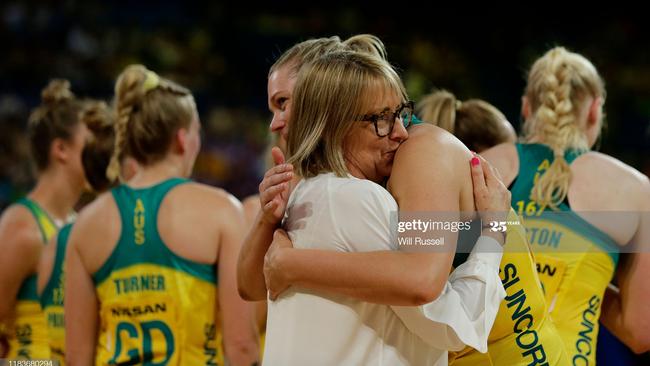
It’s the same dynamic for any coach working with a great team: plenty of blame and little credit. The Diamonds’ success meant that the rare losses were always a bigger story than the many wins. And her style wasn’t immune from criticism – her reluctance to pick a starting line-up of her seven best players is often cited. Alexander insisted on playing a rotation of players that gave her more flexibility, but critics argued this approach meant the team was never able to settle into a rhythm and develop confidence together. The difficulty of Alexander’s job was compounded by some rapid changes in her sport after Netball Australia launched a new national Super Netball in 2017. Player salaries were growing fast, commercial pressures growing faster, and much of the attention inside the netball head office shifted from the national team to the survival of this new league.
Alexander often complained publicly about the absence of a cap on imports in this new league; she saw international stars sending promising Australian players to the bench. Other nations clearly benefited from that unlimited imports rule. England and South Africa both began pushing Australia and New Zealand for podium spots at major tournaments.
Ultimately it was two losses that sealed Alexander’s fate. In 2018, Australia was upset by England by a single goal in the gold medal match at the Gold Coast Commonwealth Games. It was hailed as the biggest boilover in the sport’s history. It was only after the devastated players had left the changing room for a media commitment that Alexander allowed the moment to finally hit her. “Nothing was more poignant after that loss than me being basically in tears with my performance analyst Dr Mitch Mooney, and how gutted we both were. If only you could have got a photo,’’ she says. “You go from winning a World Cup in your home country, where you think you’re it and a bit, to the complete devastation.”
Alexander prepared for the 2019 Netball World Cup in Liverpool knowing it could well be her last as the head coach. Netball coaches work in four-year terms that conclude with a World Cup. She was under no illusions about the difficulty of the task ahead. A wave of retirements had left her with a promising but inexperienced squad. The Diamonds were up against their old foes, New Zealand’s Silver Ferns, in the final. Legendary American football coach Vince Lombardi is often quoted as saying his Green Bay Packers never lost a game, but simply ran out of time. Alexander feels the same way about the 2019 final.
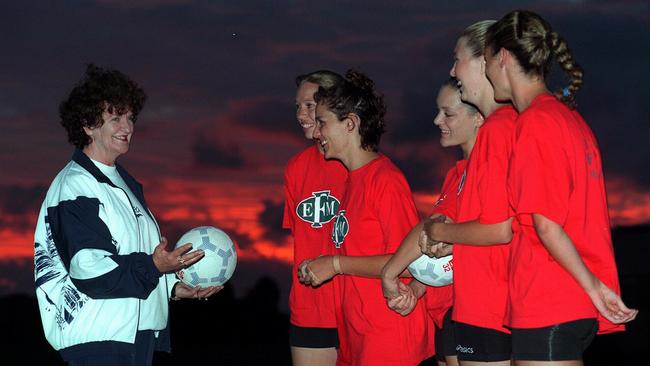
The Diamonds lost their biggest game by a single goal for the second straight year. Alexander’s own response in these devastating moments was to focus on the process and think her way through the pain. “In those moments I just try to think about the emotions that I need to feel, how to calm myself so that I can really assist the players to feel better about what’s just happened. And it’s not easy, because you’re hurting yourself. But that’s not your job.” Alexander recalls a saying she learned from Joyce Brown: It’s them [the players] that’s sweatin’ the sweat, bleedin’ the blood and breaking the bones, not you.
But Alexander was well aware of the situation she was flying home to. “I knew I’d be under pressure, definitely.” As Brown points out, that has always been the way in Australian netball; she simply sees it as the hard reality for a sport that has had to fight to survive for more than 75 years in Australia. “We are a hard bunch,” Brown says. “We are used to winning, and that’s what we demand. Sponsors are attracted to people who win, and we are a women’s sport, a non-Olympic sport, and so to be sure that we get noticed by our governments and by sponsors we need to win. And so for the people in netball, to lose gold medals is almost taken as a personal blow.”
A week after the 2019 World Cup loss, Australia’s players returned to their clubs to complete the Super Netball season. In the background, Netball Australia conducted its routine post-tournament review. There was a small measure of retribution in October when Australia won a four-match test series against New Zealand to bring the year to a close. Alexander’s relief was palpable; as the team raised the trophy under a deluge of green and gold confetti, the usually reserved coach suddenly lay down on the Perth Arena court in front of her players, beaming as she posed for the cameras. It ultimately did little to sway the tide of opinion on Alexander. She won’t name names, but simply says that “forces at play” were agitating for change, loudly.
At the 2019 Australian Netball Awards, held on a November night in Sydney, Alexander’s husband watched the room closely, and noticed that many of Netball Australia’s leaders were avoiding her. His instinct was right. Within weeks, the message came from Netball Australia chief executive Marne Fechner and chair Paolina Hunt: the coaching position would be “taken to market”.
“I was told that I had lost two finals, and that was it,” says Alexander. Fechner says the decision was an excruciatingly difficult one. “It was such a hard message to deliver, and it would have been a really hard message for Lisa to hear because it wasn’t what she wanted,” she says. “And I think that she was extraordinarily professional.”
The news was kept secret for almost two months, a remarkable achievement in a sport with a very active bush telegraph. Alexander told her husband, but no one else. Then Alexander and Fechner fronted the cameras in February on that court at the Victorian Institute of Sport, and calmly read two prepared statements to an unusually large press pack. A collection of current and former Diamonds huddled in the back of the room in a show of support. The players were visibly emotional. Alexander wasn’t. She was determined to maintain the same stoicism she’d shown throughout the hardest moments of her career. “The Australian people don’t want to have a blithering mess, they want to see some dignity and strength of character. Strength of character, and also telling the truth, really,” she explains.
“It was extremely important to me. I thought of my mum at that time, and the way she was as a woman. I did the eulogy at her funeral, and everyone was amazed that I could keep myself as together as I did. And I said, ‘Well, I have to, because my mum would expect that’.”
And besides, she had spent years telling her players “we before me”, and this was a chance to live her own ethos and exit the stage quietly. She was brutally honest. Alexander had no interest in “crapping on and saying I was stepping down or retiring”. That would have looked disingenuous. It was a surprisingly clean departure. Neither party tipped the bucket, and there was no attempt to background the press to justify the move.
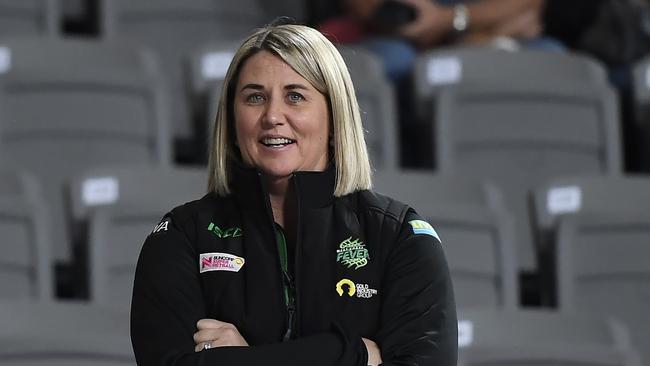
Alexander has now been replaced by another coach who has never played for Australia, 39-year-old Stacey Marinkovich. The announcement in August was met with surprise and scepticism in the netball community. Once again the national coach will have to prove her worth to a crowd of harsh critics.
After the announcement, Alexander suddenly felt very isolated. After years of constant media contact, the phone stopped ringing. “Once you’re out,” she says, “you can critically analyse the time away from family. The time you can’t be yourself, that you’re always representing someone, and that you’re having to kiss someone’s backside or whatever. And it’s tiring. Maybe it’s been a blessing in disguise in many ways.”
There have been plenty of conversations with former players throughout the year to discuss news and analyse games. Coaching, she says, is addictive. And despite all that pressure, and the trauma of being fired, she’s already thinking about her next move. “There is a bit of an itch there. I’ve always loved coaching. “The greatest sense that I have is when I’m on the court with the players, and we’re working away at what we’re doing. That’s when I feel at my best, and most peaceful.”


To join the conversation, please log in. Don't have an account? Register
Join the conversation, you are commenting as Logout